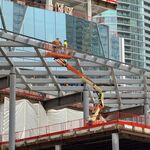Glen
Senior Member
Communities in Boom: Canada’s Top Entrepreneurial Cities
http://www.cfib-fcei.ca/english/res...m__canada’s_top_entrepreneurial_cities.html
Toronto is now dead last on a list of 96, while suburban Toronto, known as the 905 district, sits at 33. The evidence is clear that businesses, some with a need to stay close to Toronto, are opting for the suburbs.
Read more: http://www.financialpost.com/small-business/story.html?id=2118500
http://www.cfib-fcei.ca/english/res...m__canada’s_top_entrepreneurial_cities.html
Toronto is now dead last on a list of 96, while suburban Toronto, known as the 905 district, sits at 33. The evidence is clear that businesses, some with a need to stay close to Toronto, are opting for the suburbs.
Read more: http://www.financialpost.com/small-business/story.html?id=2118500




